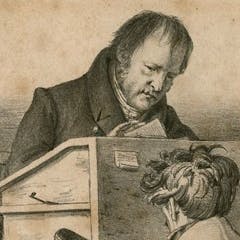
Articles on Philosophers
Displaying all articles

Introspection, argument, exploring paradoxes: These are hallmarks of great artists, not just philosophers.

Athens was deeply polarized over big-picture questions, and Socrates was never hesitant to question both sides’ assumptions – or his own.

He was an important philosopher, mathematician and social reformer of his time. But Richard Price was subsequently written out of history.

With the discovery of several thousand new pages of Hegel’s lecture notes, fans are hoping his famously tricky philosophy may become easier to understand – this expert isn’t so sure.

The Athens fires were a dangerous reflection of Atomist philosophies that see the world as exploitable, for sale and open to waste and abuse.

John Locke and John Stuart Mill don’t provide much in the way of justification for ignoring public health advice in a pandemic. Mikhail Bakunin, however…

In our “post-truth” political era, there is a lot we can learn from an under-appreciated philosopher who focused on “thinking clearly.”

Over two centuries. the notion of boredom has shifted from an upper-class malady, through existential peril, to a functional emotion.

A mother with underlying conditions wants to hug her children even if means risking her own life with COVID-19. Should they abide by her wishes or keep their distance?

Involving family and friends in decisions or rethinking the meaning of “getting back to normal” helps protect against cognitive bias and its harmful consequences.

Strippers, by the nature of their jobs, need to get close to others. Is there a way to do this safely during the coronavirus crisis?

Thomas Hobbes wrote that humans are motivated by self-interest. Often that means working together for the benefit of all.

Travel and philosophy have enjoyed a quiet love affair for centuries.

From human suffering to political chicanery to environmental degradation, the tide of bad news, blared in headlines every day, seems overwhelming. One poet and classics scholar asks: What can be done?

The great thinker left thousands of comments in the margins of his personal library. Now these are being digitised and catalogued.

“Critique of Black Reason” offers readers insight into how the construction of race and racism underpins our understanding of modernity.

A scholar suggests a few approaches that have withstood the test of time.

A philosopher explains how to learn from the stoicism of Roman philosophers to cope with present-day troubles.
